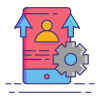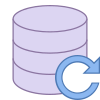Enquiry Form
What are Business Intelligence software?
Business Intelligence (BI) software are software applications designed to collect, process, and analyze data to provide actionable insights for informed decision-making. These tools help businesses visualize data trends, measure performance, and identify opportunities or challenges in real-time. By transforming raw data into meaningful information, BI tools empower organizations to drive efficiency, improve decision-making, and stay competitive in dynamic markets.
What are the Best Features of Business Intelligence Software?
Here are 15 essential features of BI software that help businesses unlock the full potential of their data:

Data Integration
Connect multiple data sources, including databases, spreadsheets, and cloud platforms, for unified analysis.

Interactive Dashboards
Create customizable dashboards to visualize real-time metrics and KPIs.

Data Visualization
Use charts, graphs, and heatmaps to present complex data in an easy-to-understand format.

Self-Service Analytics
Enable non-technical users to explore and analyze data without relying on IT teams.

Reporting Tools
Automate the generation of detailed, shareable reports tailored to specific business needs.

Real-Time Analytics
Access up-to-the-minute insights for faster decision-making.

Predictive Analytics
Leverage advanced algorithms to forecast trends and outcomes.

Data Filtering
Apply filters to focus on specific datasets and derive meaningful insights.

Mobile Accessibility
Access BI software on the go through mobile apps for real-time data analysis.

Collaboration Tools
Share dashboards and reports across teams to enhance collaboration and alignment.

Data Security
Protect sensitive information with role-based access controls and encryption.

ETL (Extract, Transform, Load) Capabilities
Cleanse and transform raw data for accurate analysis.

Natural Language Query
Use plain language to query data, making analytics more accessible.

Integration with External Tools
Seamlessly integrate with ERP, CRM, and other business systems.

Scalability
Handle growing data volumes and user requirements as your business expands.
How it Works
- Data Collection: Gather data from multiple sources, including databases, spreadsheets, and cloud systems.
- Data Transformation: Cleanse, normalize, and organize raw data for analysis.
- Visualization: Use dashboards and visual tools to interpret data and highlight trends.
- Reporting: Generate automated reports tailored to business requirements.
- Collaboration: Share insights and dashboards across teams for aligned decision-making.
- Scalability: Expand features and integrate new data sources as your business grows.
Which Businesses Need Business Intelligence Software?
BI software is invaluable for businesses across industries, helping them leverage data for growth and efficiency. Here’s how they serve different sectors:

- Sales Analytics: Track sales trends and performance across channels.
- Inventory Optimization: Analyze stock levels to avoid overstocking or stock outs.
- Customer Insights: Understand purchasing behavior to refine marketing strategies.
- Profitability Analysis: Identify high-margin products and areas for cost savings.
- Market Trends: Monitor market shifts to stay competitive.

- Risk Management: Use predictive analytics to assess and mitigate financial risks.
- Portfolio Analysis: Monitor investment performance and optimize asset allocation.
- Regulatory Compliance: Automate compliance reporting meeting industry standards.
- Customer Analytics: Identify client needs to offer personalized financial products.
- Expense Management: Analyze spending patterns to control operational costs.

- Patient Analytics: Track patient outcomes and improve care delivery.
- Operational Efficiency: Analyze hospital operations to reduce waste and enhance efficiency.
- Resource Allocation: Optimize staff scheduling and equipment utilization.
- Regulatory Reporting: Simplify compliance with healthcare regulations.
- Cost Management: Identify opportunities for cost savings without compromising care quality.

- Production Analytics: Monitor production lines to improve efficiency and reduce downtime.
- Supply Chain Insights: Optimize supply chain operations with data-driven strategies.
- Quality Control: Analyze defect rates and improve product quality.
- Demand Forecasting: Predict market demand to plan inventory and production.
- Cost Optimization: Identify areas for reducing manufacturing costs.

- Performance Metrics: Track software performance and user engagement metrics.
- Incident Analysis: Monitor and analyze IT incidents to improve system reliability.
- Project Management: Use data to track project timelines and resource utilization.
- Customer Support Analytics: Analyze support tickets and improve response times.
- Revenue Tracking: Monitor subscription renewals and product performance.
Benefits of Business Intelligence Software
Here are eight key benefits of using BI software in your organization:

- Informed Decision-Making: Access accurate, real-time insights to make data-driven decisions.
- Enhanced Productivity: Automate data collection and reporting tasks, saving time and resources.
- Improved Forecasting: Use predictive analytics to anticipate trends and prepare for future challenges.
- Cost Efficiency: Identify cost-saving opportunities by analyzing operational inefficiencies.
- Performance Tracking: Monitor KPIs and measure team or organizational performance effectively.
- Customer Insights: Understand customer behavior and preferences to improve engagement and satisfaction.
- Scalable Solutions: Adapt BI tools to your growing business needs with modular features.
- Collaboration: Share insights across teams for better alignment and decision-making.
Top Business Intelligence Software to Boost Operational Efficiency
Explore the best Business Intelligence Software to streamline your operations, improve decision-making, and drive growth. Discover key features, benefits, and use cases.
Latest News
Be Updated With latest News And Information









